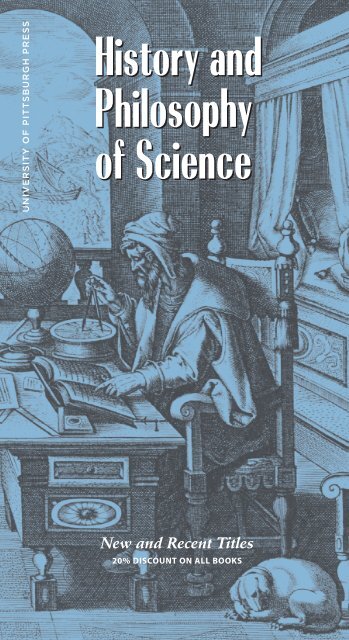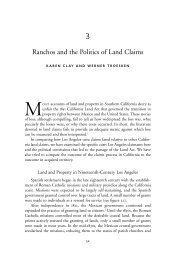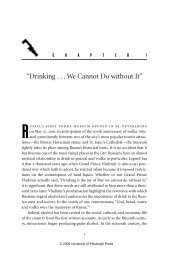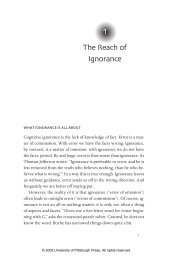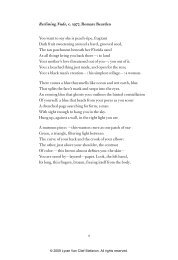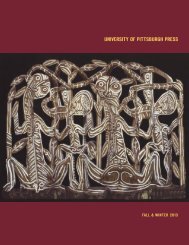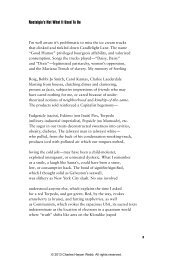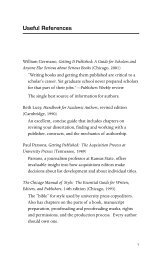History and Philosophy of Science - University of Pittsburgh Press
History and Philosophy of Science - University of Pittsburgh Press
History and Philosophy of Science - University of Pittsburgh Press
Create successful ePaper yourself
Turn your PDF publications into a flip-book with our unique Google optimized e-Paper software.
UNIVERSITY OF PITTSBURGH PRESS<br />
<strong>History</strong> <strong>and</strong><br />
<strong>Philosophy</strong><br />
<strong>of</strong> <strong>Science</strong><br />
New <strong>and</strong> Recent Titles<br />
20% DISCOUNT ON ALL BOOKS
The <strong>University</strong> <strong>of</strong> <strong>Pittsburgh</strong> <strong>Press</strong> is pleased to present its<br />
new <strong>and</strong> recent titles in the history <strong>and</strong> philosophy <strong>of</strong><br />
science. These titles represent the <strong>Press</strong>’s commitment<br />
to publishing the best scholarship in these fields. Additional<br />
sections feature our recently introduced Prologue Editions,<br />
where nearly 500 out-<strong>of</strong>-print titles have been made available<br />
again, <strong>and</strong> the <strong>Pittsburgh</strong>-Konstanz Series in the <strong>Philosophy</strong><br />
<strong>and</strong> <strong>History</strong> <strong>of</strong> <strong>Science</strong>.<br />
The <strong>Press</strong> seeks additional titles in order to amplify its already<br />
strong backlist in philosophy <strong>of</strong> science <strong>and</strong> exp<strong>and</strong> into fresh<br />
areas <strong>of</strong> promising historical research. Historical titles that are<br />
globally informed, <strong>and</strong> that reach across traditional disciplinary<br />
boundaries will be given special attention. The <strong>Press</strong> welcomes<br />
proposals that explore scientific thought <strong>and</strong> practice in any<br />
culture <strong>and</strong> during any era. Both experienced <strong>and</strong> new authors<br />
are strongly encouraged to submit proposals for new books.<br />
If you would like to make a submission, please contact Peter<br />
Kracht, Editorial Director, at pek6@pitt.edu. Information on<br />
manuscript submission is also available on our website:<br />
www.upress.pitt.edu/forAuthors.aspx.<br />
CONTENTS<br />
<strong>History</strong> <strong>of</strong> <strong>Science</strong> <strong>and</strong> Medicine …………………………3–8<br />
<strong>Philosophy</strong> <strong>of</strong> <strong>Science</strong> ………………………………………9–20<br />
<strong>Pittsburgh</strong>-Konstanz Series ………………………………21–24<br />
Prologue Editions …………………………………………………25
HISTORY OF SCIENCE NEW<br />
2012 • 320 pp.<br />
978-0-8229-4418-8 • Cloth • $27.95<br />
ITEM NO. 501 • SALE PRICE $22.36<br />
<strong>History</strong> <strong>of</strong> <strong>Science</strong><br />
The Cult <strong>of</strong> Pythagoras<br />
Math <strong>and</strong> Myths<br />
Alberto A. MArtínez<br />
“Martínez not only rigorously compares the exciting<br />
myths about Pythagoras with the sparse, <strong>and</strong> mostly<br />
contradictory, historical sources, he also explains<br />
why we have these myths <strong>and</strong> the purposes they<br />
serve. His book will be a natural first port <strong>of</strong> call for<br />
people who like to get this sort <strong>of</strong> thing right.“<br />
—Jeremy Gray, The Open <strong>University</strong><br />
“Mathematics is the last subject one would expect<br />
to be infested with mythology, but even mathematicians<br />
can fall for myths, particularly those concerning<br />
the history <strong>of</strong> their subject. In this<br />
delightful exposé, Alberto Martínez finally busts the<br />
many myths <strong>of</strong> math, <strong>and</strong> the results are both sobering<br />
<strong>and</strong> fascinating.”<br />
—John C. Stillwell, <strong>University</strong> <strong>of</strong> San Francisco<br />
In this follow-up to his popular <strong>Science</strong> Secrets, Alberto A. Martínez discusses<br />
various popular myths from the history <strong>of</strong> mathematics: that Pythagoras proved<br />
the hypotenuse theorem, that Archimedes figured out how to test the purity <strong>of</strong><br />
a gold crown while he was in a bathtub, that the Golden ratio is in nature <strong>and</strong> ancient<br />
architecture, that the young Galois created group theory the night before the<br />
pistol duel that killed him, <strong>and</strong> more. Some stories are partly true, others are entirely<br />
false, but all show the power <strong>of</strong> invention in history. Pythagoras emerges as a symbol<br />
<strong>of</strong> the urge to conjecture <strong>and</strong> “fill in the gaps” <strong>of</strong> history. He has been credited<br />
with fundamental discoveries in mathematics <strong>and</strong> the sciences, yet there is nearly<br />
no evidence that he really contributed anything to such fields at all. this book asks:<br />
how does history change when we subtract the many small exaggerations <strong>and</strong> interpolations<br />
that writers have added for over two thous<strong>and</strong> years?<br />
The Cult <strong>of</strong> Pythagoras is also about invention in a positive sense. Most people<br />
view mathematical breakthroughs as “discoveries” rather than invention or creativity,<br />
believing that mathematics describes a realm <strong>of</strong> eternal ideas. but mathematicians<br />
have disagreed about what is possible <strong>and</strong> impossible, about what counts as<br />
a pro<strong>of</strong>, <strong>and</strong> even about the results <strong>of</strong> certain operations. Was there ever invention<br />
in the history <strong>of</strong> concepts such as zero, negative numbers, imaginary numbers,<br />
quaternions, infinity, <strong>and</strong> infinitesimals?<br />
Martínez inspects a wealth <strong>of</strong> primary sources, in several languages, over a span<br />
<strong>of</strong> many centuries. by exploring disagreements <strong>and</strong> ambiguities in the history <strong>of</strong> the<br />
elements <strong>of</strong> mathematics, The Cult <strong>of</strong> Pythagoras dispels myths that obscure the<br />
actual origins <strong>of</strong> mathematical concepts. Martínez argues that an accurate history<br />
that analyzes myths reveals neglected aspects <strong>of</strong> mathematics that can encourage<br />
creativity in students <strong>and</strong> mathematicians.<br />
UNIVERSITY OF PITTSBURGH PRESS • <strong>History</strong> <strong>and</strong> <strong>Philosophy</strong> <strong>of</strong> <strong>Science</strong> 3
HISTORY OF SCIENCE<br />
<strong>Science</strong> Secrets<br />
The Truth about Darwin’s Finches,<br />
Einstein’s Wife, <strong>and</strong> Other Myths<br />
Alberto A. MArtínez<br />
“In a laudable effort to separate the fragments <strong>of</strong><br />
truth from the hype surrounding a number <strong>of</strong> eureka<br />
moments in the history <strong>of</strong> science, Martínez<br />
skillfully reveals how even the best biographers <strong>and</strong><br />
writers make plausible but incorrect connections<br />
between historical events <strong>and</strong> <strong>of</strong>ten rely on their<br />
imagination instead <strong>of</strong> the facts. This book should<br />
be required reading for all college science majors.<br />
The author’s meticulous <strong>and</strong> engaging use <strong>of</strong> historical<br />
evidence will also appeal to history <strong>of</strong> science<br />
enthusiasts.”<br />
—Library Journal<br />
“[Martínez] combines the best qualities <strong>of</strong> popular<br />
science writing with the thorough documentation<br />
that one would expect from a pr<strong>of</strong>essional historian.<br />
Highly recommended.”<br />
—Choice<br />
2011 • 344 pp.<br />
978-0-8229-4407-2 • Cloth • $24.95<br />
ITEM NO. 502 • SALE PRICE $19.96<br />
Was Darwin really inspired by Galápagos finches? Did einstein’s wife secretly contribute<br />
to his theories? Did Franklin fly a kite in a thunderstorm? Did a falling apple<br />
lead newton to universal gravity? Did Galileo drop objects from the leaning tower<br />
<strong>of</strong> Pisa? Did einstein really believe in God?<br />
<strong>Science</strong> Secrets answers these questions <strong>and</strong> many others. It is a unique study <strong>of</strong> how<br />
myths evolve in the history <strong>of</strong> science. Some tales are partly true, others are mostly false, yet<br />
all illuminate the tension between the need to fairly describe the past <strong>and</strong> the natural desire<br />
to fill in the blanks.<br />
energetically narrated, <strong>Science</strong> Secrets pits famous myths against extensive research from<br />
primary sources in order to accurately portray important episodes in the sciences. Alberto A.<br />
Martínez analyzes how such myths grow <strong>and</strong> rescues neglected facts that are more captivating<br />
than famous fictions. Moreover, he shows why opinions that were once secret <strong>and</strong><br />
seemingly impossible are now scientifically compelling. the book includes new findings related<br />
to the Copernican revolution, alchemy, Pythagoras, young einstein, <strong>and</strong> other events<br />
<strong>and</strong> figures in the history <strong>of</strong> science.<br />
4 UNIVERSITY OF PITTSBURGH PRESS • <strong>History</strong> <strong>and</strong> <strong>Philosophy</strong> <strong>of</strong> <strong>Science</strong>
2011 • 376 pp.<br />
978-0-8229-6151-2 • Paper • $27.95<br />
ITEM NO. 503 • SALE PRICE $22.36<br />
eBook available<br />
HISTORY OF SCIENCE<br />
Styles <strong>of</strong> Knowing<br />
A New <strong>History</strong> <strong>of</strong> <strong>Science</strong> from<br />
Ancient Times to the Present<br />
CHunGlIn KWA<br />
“[A] very readable account <strong>of</strong> the history <strong>of</strong> scientific<br />
knowledge, it deserves a much wider audience<br />
than those who are able to underst<strong>and</strong> the Dutch<br />
language.”<br />
—Isis, review <strong>of</strong> the original Dutch edition<br />
“Kwa has written not only a fine introduction to the<br />
history <strong>of</strong> science from antiquity to the twenty-first<br />
century, but he has used the concept <strong>of</strong> ‘style’ to illuminate<br />
various modes <strong>of</strong> scientific rationality <strong>and</strong><br />
current threats to freedom <strong>of</strong> inquiry. A most impressive<br />
achievement.”<br />
—Harold J. Cook, Brown <strong>University</strong><br />
Now available in english, Styles <strong>of</strong> Knowing explores the development <strong>of</strong> various scientific<br />
reasoning processes in cultural-historical context. Influenced by historian Alistair<br />
Crombie’s Styles <strong>of</strong> Scientific Thinking in the European Tradition, Chunglin<br />
Kwa organizes his book according to six distinct styles: deductive, experimental, analyticalhypothetical,<br />
taxonomic, statistical, <strong>and</strong> evolutionary. Instead <strong>of</strong> featuring individual scientific<br />
disciplines in different chapters, each chapter explains the historical applications <strong>of</strong> each<br />
style’s unique criterion for good science. Kwa shows also how styles have influenced each<br />
other <strong>and</strong> transformed over time. In a chapter written especially for American audiences, Kwa<br />
examines how changes in engineering <strong>and</strong> technology during the twentieth century affected<br />
the balance among the various styles <strong>of</strong> science.<br />
based on extensive research in Greek <strong>and</strong> latin primary sources <strong>and</strong> numerous modern<br />
secondary sources, Kwa demonstrates the heterogeneous nature <strong>of</strong> scientific discovery. this<br />
accessible <strong>and</strong> innovative introduction to scientific change provides a foundational history for<br />
the classroom, historians, <strong>and</strong> nonspecialists.<br />
UNIVERSITY OF PITTSBURGH PRESS • <strong>History</strong> <strong>and</strong> <strong>Philosophy</strong> <strong>of</strong> <strong>Science</strong> 5
HISTORY OF SCIENCE<br />
The Dispute <strong>of</strong> the<br />
New World<br />
The <strong>History</strong> <strong>of</strong> a Polemic, 1750-1900<br />
Antonello GerbI<br />
translated by JereMy Moyle<br />
“Vast <strong>and</strong> fascinating. Now at last, updated <strong>and</strong> admirably translated<br />
by Dr. Jeremy Moyle, we have it in English; <strong>and</strong> none too<br />
soon, for this is a book which should be on the shelf <strong>of</strong> everyone<br />
who is curious not only about the European image <strong>of</strong> America<br />
but also about the history <strong>of</strong> man's attitude to man. Dr.<br />
Gerbi’s study is a monument both to erudition <strong>and</strong> to fastidious<br />
wit; the outcome <strong>of</strong> years <strong>of</strong> reading <strong>and</strong> reflection by a historian<br />
<strong>of</strong> ideas who is at once playful <strong>and</strong> wise.”<br />
—New York Review <strong>of</strong> Books<br />
“Gerbi’s book is fascinating. His scholarship is vast. A superb<br />
<strong>and</strong> significant study dealing with an aspect <strong>of</strong> the Enlightenment<br />
that is usually ignored. The work will be <strong>of</strong> interest to a<br />
wide range <strong>of</strong> scholars in the history <strong>of</strong> ideas.”<br />
—Journal <strong>of</strong> the <strong>History</strong> <strong>of</strong> <strong>Philosophy</strong><br />
Nature in the<br />
New World<br />
From Christopher Columbus to<br />
Gonzalo Fernández de Oviedo<br />
Antonello GerbI<br />
translated by JereMy Moyle<br />
“This book glows with the fully assimilated learning <strong>of</strong> the polymath<br />
Gerbi, whose comm<strong>and</strong> <strong>and</strong> underst<strong>and</strong>ing <strong>of</strong> the literature<br />
<strong>of</strong> various cultures enlightens every page. Neither a notice<br />
nor a full-fledged review could do justice either to the brilliance<br />
<strong>of</strong> the book or to the felicity <strong>of</strong> Moyle’s translation. The book<br />
must be read to be appreciated.”<br />
—Early American Literature<br />
“A fascinating work, it is divided into two parts: the first deals<br />
with eleven writers from Columbus to Verrazzano, while the remaining<br />
two-thirds <strong>of</strong> the book deal with the other treasure from<br />
the Indies—Oviedo’s writings <strong>and</strong> observations. This prodigiously<br />
learned work is full <strong>of</strong> good things.”<br />
—American Historical Review<br />
2010 • 720 pp.<br />
978-0-8229-6081-2 • Paper • $29.95<br />
ITEM NO. 504 • SALE PRICE $23.96<br />
eBook available<br />
2010 • 480 pp.<br />
978-0-8229-6080-5 • Paper • $29.95<br />
ITEM NO. 505 • SALE PRICE $23.96<br />
eBook available<br />
6 UNIVERSITY OF PITTSBURGH PRESS • <strong>History</strong> <strong>and</strong> <strong>Philosophy</strong> <strong>of</strong> <strong>Science</strong>
HISTORY OF MEDICINE NEW<br />
2012 • 576 pp.<br />
978-0-8229-4413-3 • Cloth • $65.00<br />
ITEM NO. 506 • SALE PRICE $52.00<br />
eBook available<br />
<strong>History</strong> <strong>of</strong> Medicine<br />
A <strong>History</strong> <strong>of</strong><br />
Organ Transplantation<br />
Ancient Legends to Modern Practice<br />
DAVID HAMIlton<br />
“This beautiful history . . . gives a sense <strong>of</strong> the vivacity<br />
<strong>of</strong> scientific experience, its errors <strong>and</strong> insights,<br />
<strong>and</strong> the way in which cultural traits, individual lives,<br />
<strong>and</strong> technical knowledge combine to create a field<br />
<strong>of</strong> clinical medicine. . . . Those who are willing to<br />
read David Hamilton will find a well-written <strong>and</strong> exciting<br />
history—physiology <strong>and</strong> medicine, <strong>and</strong> the<br />
lives <strong>of</strong> those who pursue them, will seem more fascinating,<br />
<strong>and</strong> science more wild <strong>and</strong> willful.”<br />
—Times Literary Supplement<br />
“A comprehensive, authoritative history <strong>of</strong> a transformative<br />
field <strong>of</strong> medicine. This history is well<br />
crafted <strong>and</strong> global in scope. . . . scholars <strong>and</strong> historians<br />
<strong>of</strong> medicine will find Hamilton a thorough<br />
guide to a complex subject.”<br />
—Library Journal<br />
A<strong>History</strong> <strong>of</strong> Organ Transplantation is a comprehensive <strong>and</strong> ambitious exploration<br />
<strong>of</strong> transplant surgery—which, surprisingly, is one <strong>of</strong> the longest continuous<br />
medical endeavors in history. Moreover, no other medical enterprise<br />
has had so many multiple interactions with other fields, including biology, ethics,<br />
law, government, <strong>and</strong> technology. exploring the medical, scientific, <strong>and</strong> surgical<br />
events that led to modern transplant techniques, Hamilton argues that progress in<br />
successful transplantation required a unique combination <strong>of</strong> multiple methods, bold<br />
surgical empiricism, <strong>and</strong> major immunological insights in order for surgeons to develop<br />
an underst<strong>and</strong>ing <strong>of</strong> the body’s most complex <strong>and</strong> mysterious mechanisms.<br />
Surgical progress was nonlinear, sometimes reverting <strong>and</strong> sometimes significantly<br />
advancing through luck, serendipity, or helpful accidents <strong>of</strong> nature.<br />
the first book <strong>of</strong> its kind, A <strong>History</strong> <strong>of</strong> Organ Transplantation examines the evolution<br />
<strong>of</strong> surgical tissue replacement from classical times to the medieval period to<br />
the present day. this well-executed volume will be useful to undergraduates, graduate<br />
students, scholars, surgeons, <strong>and</strong> the general public. both Western <strong>and</strong> non-<br />
Western experiences as well as folk practices are included.<br />
UNIVERSITY OF PITTSBURGH PRESS • <strong>History</strong> <strong>and</strong> <strong>Philosophy</strong> <strong>of</strong> <strong>Science</strong> 7
NEW HISTORY OF MEDICINE<br />
Influenza<br />
A Century <strong>of</strong> <strong>Science</strong> <strong>and</strong><br />
Public Health Response<br />
GeorGe DeHner<br />
“Flu shots are an autumn ritual for millions <strong>of</strong><br />
Americans, but few know the history <strong>of</strong> the battle<br />
against influenza waged by physicians <strong>and</strong> public<br />
health <strong>of</strong>ficers around the globe over the past 120<br />
years. Dehner explains how past p<strong>and</strong>emics, which<br />
increasingly shaped reliance upon vaccination <strong>and</strong><br />
surveillance as prevention, evolved from local to regional<br />
to national to international responsibility. All<br />
those interested in the history <strong>of</strong> disease <strong>and</strong> the<br />
history <strong>of</strong> public health will benefit from his rich<br />
discussion <strong>of</strong> how today’s globalism is again changing<br />
how quickly diseases spread as well as the politics<br />
<strong>and</strong> requirements <strong>of</strong> influenza prevention.”<br />
—Alan M. Kraut, American <strong>University</strong><br />
“Well researched <strong>and</strong> written, this study ranges<br />
from the Russian flu <strong>of</strong> 1889 to the swine flu <strong>of</strong><br />
2009, embracing biology <strong>and</strong> history, medicine <strong>and</strong><br />
politics, drug research <strong>and</strong> government regulation.<br />
Dehner skillfully frames U. S. influenza experience<br />
in the global context <strong>and</strong> sheds new light on the<br />
power <strong>of</strong> the virus to sicken, kill, <strong>and</strong> confound.”<br />
— Carol R. Byerly, author <strong>of</strong> Fever <strong>of</strong> War: The<br />
Influenza Epidemic in the U.S. Army during World<br />
War I<br />
2012 • 296 pp.<br />
978-0-8229-6189-5 • Paper • $27.95<br />
ITEM NO. 507 • SALE PRICE $22.36<br />
eBook available<br />
In Influenza, George Dehner examines the wide disparity in national <strong>and</strong> international responses<br />
to influenza p<strong>and</strong>emics, from the russian flu <strong>of</strong> 1889 to the swine flu outbreak<br />
in 2009. He chronicles the technological <strong>and</strong> institutional progress made along the way<br />
<strong>and</strong> shows how these developments can shape an effective future policy.<br />
early p<strong>and</strong>emic response relied on methods <strong>of</strong> quarantine <strong>and</strong> individual scientific research.<br />
In the aftermath <strong>of</strong> World War II, a consensus for cooperation <strong>and</strong> shared resources<br />
led to the creation <strong>of</strong> the WHo, under the auspices <strong>of</strong> the united nations. today, the WHo<br />
maintains a large <strong>and</strong> proactive role in responding to influenza outbreaks. International p<strong>and</strong>emic<br />
response, however, is only as strong as its weakest national link—most recently evidenced<br />
in the failed early detection <strong>of</strong> the 2009 swine flu in Mexico <strong>and</strong> the delayed<br />
reporting <strong>of</strong> the 2002 SArS outbreak in China.<br />
As Dehner’s study contends, the hard lessons <strong>of</strong> the past highlight the need for a coordinated<br />
early warning system with full disclosure, shared technologies, <strong>and</strong> robust manufacturing<br />
capabilities. until the “national” aspect can be removed from the international equation,<br />
responses will be hampered, <strong>and</strong> a threat to an individual remains a threat to all.<br />
8 UNIVERSITY OF PITTSBURGH PRESS • <strong>History</strong> <strong>and</strong> <strong>Philosophy</strong> <strong>of</strong> <strong>Science</strong>
PHILOSOPHY OF SCIENCE NEW<br />
2011 • 232 pp.<br />
978-0-8229-6163-5 • Paper • $29.95<br />
ITEM NO. 508 • SALE PRICE $23.96<br />
eBook available<br />
<strong>Philosophy</strong> <strong>of</strong> <strong>Science</strong><br />
<strong>Science</strong> Transformed?<br />
Debating Claims <strong>of</strong> an Epochal Break<br />
edited by AlFreD norDMAnn, HAnS rADDer,<br />
<strong>and</strong> GreGor SCHIeMAnn<br />
“<strong>Science</strong> Transformed? is an important, readily accessible<br />
book that focuses on a crucial contemporary<br />
issue: the pr<strong>of</strong>ound transformation <strong>of</strong> science,<br />
technology, <strong>and</strong> society <strong>of</strong> the past few decades. We<br />
are witnessing a break <strong>of</strong> an ‘epochal nature,’ <strong>and</strong><br />
Nordmann, Radder, <strong>and</strong> Schiemann have provided<br />
us with valuable insights into what is happening.”<br />
—Silvan Schweber, Br<strong>and</strong>eis <strong>University</strong><br />
“Has science changed fundamentally during the last<br />
half century? Readymade concepts abound that<br />
claim as much: from postnormal <strong>and</strong> technoscience<br />
to the advent <strong>of</strong> a mode-2. Few are substantiated<br />
empirically. This collection does just that: probing<br />
the theses <strong>of</strong> an epochal break from a range <strong>of</strong> disciplinary<br />
vantage points, unveiling the complexity<br />
behind the fashionable rhetoric, providing fascinating<br />
insights into the new ways <strong>of</strong> research.”<br />
—Peter Weingart, Bielefeld <strong>University</strong><br />
Advancements in computing, instrumentation, robotics, digital imaging, <strong>and</strong><br />
simulation modeling have changed science into a technology-driven institution.<br />
Government, industry, <strong>and</strong> society increasingly exert their influence<br />
over science, raising questions <strong>of</strong> values <strong>and</strong> objectivity. these <strong>and</strong> other pr<strong>of</strong>ound<br />
changes have led many to speculate that we are in the midst <strong>of</strong> an epochal break<br />
in scientific history.<br />
this edited volume presents an in-depth examination <strong>of</strong> these issues from philosophical,<br />
historical, social, <strong>and</strong> cultural perspectives. It <strong>of</strong>fers arguments both for<br />
<strong>and</strong> against the epochal break thesis in light <strong>of</strong> historical antecedents. Contributors<br />
discuss topics such as: science as a continuing epistemological enterprise; the<br />
decline <strong>of</strong> the individual scientist <strong>and</strong> the rise <strong>of</strong> communities; the intertwining <strong>of</strong> scientific<br />
<strong>and</strong> technological needs; links to prior practices <strong>and</strong> ways <strong>of</strong> thinking; the alleged<br />
divide between mode-1 <strong>and</strong> mode-2 research methods; the commodification<br />
<strong>of</strong> university science; <strong>and</strong> the shift from the scientific to a technological enterprise.<br />
Additionally, they examine the epochal break thesis using specific examples, including<br />
the transition from laboratory to real world experiments; the increased reliance<br />
on computer imaging; how analog <strong>and</strong> digital technologies condition<br />
behaviors that shape the object <strong>and</strong> beholder; the cultural significance <strong>of</strong> humanoid<br />
robots; the erosion <strong>of</strong> scientific quality in experimentation; <strong>and</strong> the effect <strong>of</strong> computers<br />
on prediction at the expense <strong>of</strong> explanation.<br />
Whether these events represent a historic break in scientific theory, practice, <strong>and</strong><br />
methodology is disputed. What they do <strong>of</strong>fer is an important occasion for philosophical<br />
analysis <strong>of</strong> the epistemic, institutional <strong>and</strong> moral questions affecting current<br />
<strong>and</strong> future scientific pursuits.<br />
UNIVERSITY OF PITTSBURGH PRESS • <strong>History</strong> <strong>and</strong> <strong>Philosophy</strong> <strong>of</strong> <strong>Science</strong> 9
NEW PHILOSOPHY OF SCIENCE<br />
On Leibniz<br />
Exp<strong>and</strong>ed Edition<br />
nICHolAS reSCHer<br />
“Besides the value <strong>of</strong> his historical research <strong>and</strong> his<br />
interpretive proposals, Rescher can be credited for<br />
having shed light not only on the motives that, albeit<br />
in a different theoretical framework, speak in<br />
favour <strong>of</strong> a Leibnizian style in philosophy but also<br />
on some <strong>of</strong> the elements <strong>of</strong> Leibniz’s metaphysics<br />
relevant to our metaphysical problems.”<br />
—Studia Leibnitiana on the original edition<br />
“This collection <strong>of</strong> Rescher’s work is an invaluable<br />
record <strong>of</strong> his contributions to our underst<strong>and</strong>ings<br />
<strong>of</strong> Leibniz’ thought in the last quarter century.”<br />
—<strong>Philosophy</strong> in Review on the original edition<br />
“With this extraordinary collection we are reminded<br />
<strong>of</strong> Rescher’s philosophical roots <strong>and</strong> his inspiration.<br />
The topics covered help reveal both Leibniz’s interests<br />
<strong>and</strong> times <strong>and</strong> the enormous value <strong>of</strong> the rigor<br />
<strong>of</strong> Rescher’s scholarship.”<br />
— Joseph C. Pitt, Virginia Tech,<br />
on the original edition<br />
2013 • 320 pp.<br />
978-0-8229-6218-2 • Paper • $28.95<br />
JANUARY 2013<br />
ITEM NO. 509 • SALE PRICE $23.16<br />
Contemporary philosopher John Searle has characterized Gottfried Wilhelm leibniz<br />
(1646–1716) as “the most intelligent human being who has ever lived.” the German<br />
philosopher, mathematician, <strong>and</strong> logician invented calculus (independently <strong>of</strong> Sir<br />
Isaac newton), topology, determinants, binary arithmetic, symbolic logic, rational mechanics,<br />
<strong>and</strong> much more. His metaphysics bequeathed a set <strong>of</strong> problems <strong>and</strong> approaches that have<br />
influenced the course <strong>of</strong> Western philosophy from Kant in the eighteenth century until the<br />
present day.<br />
On Leibniz examines many aspects <strong>of</strong> leibniz’s work <strong>and</strong> life. this exp<strong>and</strong>ed edition adds<br />
new chapters that explore leibniz’s revolutionary deciphering machine; his theoretical interest<br />
in cryptography <strong>and</strong> its ties to algebra; his thoughts on eternal recurrence theory; his rebuttal<br />
<strong>of</strong> the thesis <strong>of</strong> improvability in the world <strong>and</strong> cosmos; <strong>and</strong> an overview <strong>of</strong> American<br />
scholarship on leibniz.<br />
other chapters reveal leibniz as a substantial contributor to theories <strong>of</strong> knowledge. Discussions<br />
<strong>of</strong> his epistemology <strong>and</strong> methodology, its relationship to John Maynard Keynes <strong>and</strong><br />
talmudic scholarship, broaden the traditional view <strong>of</strong> leibniz. rescher also views leibniz’s<br />
scholarly development <strong>and</strong> pr<strong>of</strong>essional career in historical context. As a “philosopher<br />
courtier” to the Hanoverian court, leibniz was associated with the leading intellectuals <strong>and</strong><br />
politicians <strong>of</strong> his era, including Spinoza, Huygens, newton, Queen Sophie Charlotte, <strong>and</strong><br />
tsar Peter the Great.<br />
rescher extrapolates the fundamentals <strong>of</strong> leibniz’s ontology: the theory <strong>of</strong> possible worlds,<br />
the world’s contingency, space-time frameworks, <strong>and</strong> intermonadic relationships. In conclusion,<br />
rescher positions leibniz as a philosophical role model for today’s scholars. He argues<br />
that many current problems can be effectively addressed with principles <strong>of</strong> process philosophy<br />
inspired by leibniz’s system <strong>of</strong> monadology.<br />
10 UNIVERSITY OF PITTSBURGH PRESS • <strong>History</strong> <strong>and</strong> <strong>Philosophy</strong> <strong>of</strong> <strong>Science</strong>
PHILOSOPHY OF SCIENCE NEW<br />
2012 • 312 pp.<br />
978-0-8229-4416-4 • Cloth • $65.00<br />
ITEM NO. 510 • SALE PRICE $52.00<br />
eBook available<br />
Peeling Potatoes or<br />
Grinding Lenses<br />
Spinoza <strong>and</strong> Young Wittgenstein<br />
Converse on Immanence <strong>and</strong> Its Logic<br />
ArIStIDeS bAltAS<br />
“In Aristides Baltas’s widely learned <strong>and</strong> bracingly<br />
surprising interpretation, God for Spinoza <strong>and</strong> Logic<br />
for Wittgenstein emerge as specific expressions <strong>of</strong><br />
the human need for an absolute authority from<br />
whose point <strong>of</strong> view the whole <strong>of</strong> reality or language<br />
can be understood <strong>and</strong> evaluated at once. Spinoza<br />
<strong>and</strong> Wittgenstein emerge, in turn, as implacable enemies<br />
<strong>of</strong> any such authority <strong>and</strong> make common<br />
cause against its claims to legislate what can be<br />
thought, valued, <strong>and</strong> done. Controversial <strong>and</strong> fascinating,<br />
the book is bound to provoke intense discussion<br />
<strong>and</strong>—more important—serious thought.”<br />
—Alex<strong>and</strong>er Nehamas, Princeton <strong>University</strong><br />
“It is fascinating to watch Baltas carefully, precisely,<br />
<strong>and</strong> in loving detail erect his argument from the historical<br />
texts <strong>and</strong> then defend it in his inimitable elegant<br />
fashion. This is a book to dwell in with<br />
enormous rewards. I recommend it wholeheartedly.”<br />
—George Gale, <strong>University</strong> <strong>of</strong> Missouri-Kansas City<br />
“I can work best now while peeling potatoes. . . .<br />
It is for me what lens-grinding was for Spinoza.”—L. Wittgenstein<br />
More than 250 years separate the publication <strong>of</strong> baruch Spinoza’s Ethics <strong>and</strong> ludwig<br />
Wittgenstein’s Tractatus Logico-Philosophicus. both are considered monumental<br />
philosophical treatises, produced during markedly different times in human<br />
history, <strong>and</strong> notoriously challenging to interpret. In Peeling Potatoes or Grinding Lenses, Aristides<br />
baltas contends that these works bear a striking similarity based on the idea <strong>of</strong> “radical<br />
immanence.” each purports to underst<strong>and</strong> the world, thought, <strong>and</strong> language from the inside<br />
<strong>and</strong> in a way leading to the dissolution <strong>of</strong> all philosophy. In that guise, both <strong>of</strong>fer a powerful<br />
argument against fundamentalism <strong>of</strong> all sorts <strong>and</strong> kinds.<br />
to Spinoza, God is just nature. God is not above or separate from the world, humanity,<br />
or mere objects for, as nature, He inheres in everything. to Wittgenstein, logic is not above<br />
or separate from language, thought, <strong>and</strong> the world. the hardness <strong>of</strong> the logical “must” inheres<br />
in states <strong>of</strong> affairs, facts, thoughts, <strong>and</strong> linguistic acts. outside there are no truths or sense—<br />
only nonsense.<br />
through close readings <strong>of</strong> the texts based on lessons drawn from radical paradigm change<br />
in science, baltas finds in both works a single-minded purpose, implacable reasoning, <strong>and</strong> an<br />
austerity <strong>of</strong> style that are rare in the history <strong>of</strong> philosophy. He analyzes the structure <strong>and</strong> content<br />
<strong>of</strong> each treatise, the authors’ intentions, the limitations <strong>and</strong> possibilities afforded by scientific<br />
discovery in their respective eras, their radical opposition to prevailing philosophical<br />
views, <strong>and</strong> draws out the particulars, as well as the implications, <strong>of</strong> the arresting match between<br />
the two.<br />
UNIVERSITY OF PITTSBURGH PRESS • <strong>History</strong> <strong>and</strong> <strong>Philosophy</strong> <strong>of</strong> <strong>Science</strong> 11
PHILOSOPHY OF SCIENCE<br />
The Commodification<br />
<strong>of</strong> Academic Research<br />
<strong>Science</strong> <strong>and</strong> the Modern <strong>University</strong><br />
edited by HAnS rADDer<br />
“With this pioneering volume, Hans Radder has<br />
turned the commodification <strong>of</strong> research into an<br />
issue for the philosophy <strong>of</strong> science. The contributors<br />
present a broad range <strong>of</strong> views, united by the<br />
fact that they take commodification as both a practical<br />
problem <strong>and</strong> a theoretical one. This provocative<br />
book will lead us to reevaluate our thinking<br />
about the norms <strong>of</strong> science <strong>and</strong> how they should relate<br />
to new economies <strong>of</strong> knowledge.”<br />
—Sergio Sismondo, Queen’s <strong>University</strong><br />
“The threat to academic culture by commodification<br />
is a hot <strong>and</strong> controversial topic, <strong>and</strong> publications<br />
addressing it abound. This carefully crafted<br />
collection reaches beyond many <strong>of</strong> them by bringing<br />
together a broad variety <strong>of</strong> perspectives—<br />
sociological, ethical, historical <strong>and</strong> philosophical —<br />
probing the issue with scholarly detachment, scientific<br />
rigor, <strong>and</strong> passion for the culture <strong>of</strong> public<br />
science.”<br />
—Peter Weingart, Universität Bielefeld<br />
2010 • 360 pp.<br />
978-0-8229-6226-7 • Paper • $29.95<br />
ITEM NO. 511 • SALE PRICE $23.96<br />
Selling science has become a common practice in contemporary universities. this commodification<br />
<strong>of</strong> academia pervades many aspects <strong>of</strong> higher education, including research,<br />
teaching, <strong>and</strong> administration. As such, it raises significant philosophical,<br />
political, <strong>and</strong> moral challenges. this volume <strong>of</strong>fers the first book-length analysis <strong>of</strong> this disturbing<br />
trend from a philosophical perspective <strong>and</strong> presents views by scholars <strong>of</strong> philosophy<br />
<strong>of</strong> science, social <strong>and</strong> political philosophy, <strong>and</strong> research ethics.<br />
the epistemic <strong>and</strong> moral responsibilities <strong>of</strong> universities, whether for-pr<strong>of</strong>it or nonpr<strong>of</strong>it, are<br />
examined from several philosophical st<strong>and</strong>points. the contributors discuss the pertinent epistemological<br />
<strong>and</strong> methodological questions, the sociopolitical issues <strong>of</strong> the organization <strong>of</strong> science,<br />
the tensions between commodified practices <strong>and</strong> the ideal <strong>of</strong> “science for the public<br />
good,” <strong>and</strong> the role <strong>of</strong> governmental regulation <strong>and</strong> personal ethical behavior. In order to<br />
counter coercive <strong>and</strong> corruptive influences <strong>of</strong> academic commodification, the contributors consider<br />
alternatives to commodified research <strong>and</strong> <strong>of</strong>fer practical recommendations for establishing<br />
appropriate research st<strong>and</strong>ards, methodologies <strong>and</strong> institutional arrangements, <strong>and</strong> a<br />
corresponding normative ethos.<br />
12 UNIVERSITY OF PITTSBURGH PRESS • <strong>History</strong> <strong>and</strong> <strong>Philosophy</strong> <strong>of</strong> <strong>Science</strong>
2009 • 224 pp.<br />
978-0-8229-6026-3 • Paper • $27.95<br />
ITEM NO. 512 • SALE PRICE $22.36<br />
eBook available<br />
PHILOSOPHY OF SCIENCE<br />
<strong>Science</strong>, Policy, <strong>and</strong><br />
the Value-Free Ideal<br />
HeAtHer e. DouGlAS<br />
“<strong>Science</strong>, Policy, <strong>and</strong> the Value-Free Ideal is an important<br />
contribution to the debate over science <strong>and</strong><br />
values, <strong>and</strong> its account <strong>of</strong> value-laden science will<br />
be <strong>of</strong> interest to philosophers concerned with policy,<br />
scientific objectivity, <strong>and</strong> the social relevance <strong>of</strong> philosophy<br />
<strong>of</strong> science. A welcome invitation for<br />
philosophers <strong>of</strong> science to engage more fully with<br />
policy issues, a too-<strong>of</strong>ten neglected aspect <strong>of</strong> scientific<br />
practice.”<br />
—Notre Dame Philosophical Reviews<br />
“A wonderfully evenh<strong>and</strong>ed argument for the impossibility<br />
<strong>of</strong> the ‘value-free ideal’ in science. Highly<br />
recommended.”<br />
—Choice<br />
“Occupies a unique niche bridging philosophy <strong>and</strong><br />
risk assessment. Everyone involved in providing<br />
<strong>and</strong> using scientific advice, <strong>and</strong> in doing risk analysis<br />
in general, would benefit from thinking about<br />
the issues <strong>and</strong> arguments presented in the book.”<br />
—Risk Analysis<br />
The role <strong>of</strong> science in policymaking has gained unprecedented stature in the united<br />
States, raising questions about the place <strong>of</strong> science <strong>and</strong> scientific expertise in the<br />
democratic process. Some scientists have been given considerable epistemic authority<br />
in shaping policy on issues <strong>of</strong> great moral <strong>and</strong> cultural significance, <strong>and</strong> the politicizing<br />
<strong>of</strong> these issues has become highly contentious.<br />
Since World War II, most philosophers <strong>of</strong> science have purported the concept that science<br />
should be “value-free.” In <strong>Science</strong>, Policy, <strong>and</strong> the Value-Free Ideal, Heather e. Douglas argues<br />
that such an ideal is neither adequate nor desirable for science. She contends that the<br />
moral responsibilities <strong>of</strong> scientists require the consideration <strong>of</strong> values even at the heart <strong>of</strong> science.<br />
She lobbies for a new ideal in which values serve an essential function throughout scientific<br />
inquiry, but where the role values play is constrained at key points, thus protecting the<br />
integrity <strong>and</strong> objectivity <strong>of</strong> science. In this vein, Douglas outlines a system for the application<br />
<strong>of</strong> values to guide scientists through points <strong>of</strong> uncertainty fraught with moral valence.<br />
Following a philosophical analysis <strong>of</strong> the historical background <strong>of</strong> science advising <strong>and</strong> the<br />
value-free ideal, Douglas defines how values should—<strong>and</strong> should not—function in science.<br />
She discusses the distinctive direct <strong>and</strong> indirect roles for values in reasoning, <strong>and</strong> outlines<br />
seven senses <strong>of</strong> objectivity, showing how each can be employed to determine the reliability<br />
<strong>of</strong> scientific claims. Douglas then uses these philosophical insights to clarify the distinction<br />
between junk science <strong>and</strong> sound science to be used in policymaking. In conclusion, she calls<br />
for greater openness on the values utilized in policymaking, <strong>and</strong> more public participation in<br />
the policymaking process, by suggesting various models for effective use <strong>of</strong> both the public<br />
<strong>and</strong> experts in key risk assessments.<br />
UNIVERSITY OF PITTSBURGH PRESS • <strong>History</strong> <strong>and</strong> <strong>Philosophy</strong> <strong>of</strong> <strong>Science</strong> 13
PHILOSOPHY OF SCIENCE<br />
Scientific Underst<strong>and</strong>ing<br />
Philosophical Perspectives<br />
edited by HenK de reGt, SAbInA leonellI,<br />
<strong>and</strong> KAI eIGner<br />
“An excellent work, which clearly argues that science,<br />
a product <strong>of</strong> human activity, cannot exist apart<br />
<strong>and</strong> separately from the humans that perform science,<br />
but rather must function in the interstices between<br />
them to create a pluralism <strong>of</strong> underst<strong>and</strong>ing.<br />
Highly recommended.”<br />
—Choice<br />
“How to underst<strong>and</strong> scientific underst<strong>and</strong>ing is fast<br />
becoming a ‘hot’ topic within the philosophy <strong>of</strong> science.<br />
This eclectic <strong>and</strong> wide-ranging collection<br />
makes a virtue out <strong>of</strong> the diversity <strong>of</strong> views on the<br />
subject. Featuring some <strong>of</strong> the best researchers in<br />
this area, it surveys the terrain <strong>and</strong> sets new directions<br />
for future research.”<br />
—Steven French, <strong>University</strong> <strong>of</strong> Leeds<br />
2009 • 368 pp.<br />
978-0-8229-4378-5 • Cloth • $65.00<br />
ITEM NO. 513 • SALE PRICE $52.00<br />
eBook available<br />
To most scientists, <strong>and</strong> to those interested in the sciences, underst<strong>and</strong>ing is the ultimate<br />
aim <strong>of</strong> scientific endeavor. In spite <strong>of</strong> this, underst<strong>and</strong>ing, <strong>and</strong> how it is achieved, has<br />
received little attention in recent philosophy <strong>of</strong> science. Scientific Underst<strong>and</strong>ing seeks<br />
to reverse this trend by providing original <strong>and</strong> in-depth accounts <strong>of</strong> the concept <strong>of</strong> underst<strong>and</strong>ing<br />
<strong>and</strong> its essential role in the scientific process. to this end, the chapters in this volume<br />
explore <strong>and</strong> develop three key topics: underst<strong>and</strong>ing <strong>and</strong> explanation, underst<strong>and</strong>ing<br />
<strong>and</strong> models, <strong>and</strong> underst<strong>and</strong>ing in scientific practice.<br />
earlier philosophers, such as Carl Hempel, dismissed underst<strong>and</strong>ing as subjective <strong>and</strong><br />
pragmatic. they believed that the essence <strong>of</strong> science was to be found in scientific theories <strong>and</strong><br />
explanations. In Scientific Underst<strong>and</strong>ing, the contributors maintain that we must also consider<br />
the relation between explanations <strong>and</strong> the scientists who construct <strong>and</strong> use them. they focus<br />
on underst<strong>and</strong>ing as the cognitive state that is a goal <strong>of</strong> explanation <strong>and</strong> on the underst<strong>and</strong>ing<br />
<strong>of</strong> theories <strong>and</strong> models as a means to this end.<br />
the chapters in this book highlight the multifaceted nature <strong>of</strong> the process <strong>of</strong> scientific research.<br />
the contributors examine current uses <strong>of</strong> theory, models, simulations, <strong>and</strong> experiments<br />
to evaluate the degree to which these elements contribute to underst<strong>and</strong>ing. their<br />
analyses pay due attention to the roles <strong>of</strong> intelligibility, tacit knowledge, <strong>and</strong> feelings <strong>of</strong> underst<strong>and</strong>ing.<br />
Furthermore, they investigate how underst<strong>and</strong>ing is obtained within diverse scientific<br />
disciplines <strong>and</strong> examine how the acquisition <strong>of</strong> underst<strong>and</strong>ing depends on specific<br />
contexts, the objects <strong>of</strong> study, <strong>and</strong> the stated aims <strong>of</strong> research.<br />
14 UNIVERSITY OF PITTSBURGH PRESS • <strong>History</strong> <strong>and</strong> <strong>Philosophy</strong> <strong>of</strong> <strong>Science</strong>
2009 • 248 pp.<br />
978-0-8229-4376-1 • Cloth • $45.95<br />
ITEM NO. 514 • SALE PRICE $36.76<br />
eBook available<br />
2010 • 364 pp.<br />
978-0-8229-6054-6 • Paper • $28.95<br />
ITEM NO. 515 • SALE PRICE $23.16<br />
PHILOSOPHY OF SCIENCE<br />
Scientific Models<br />
in <strong>Philosophy</strong> <strong>of</strong> <strong>Science</strong><br />
DAnIelA M. bAIler-JoneS<br />
“Indeed a book that all <strong>of</strong> us who have been working <strong>and</strong> teaching<br />
models [always] wanted to have. It will inspire many scholars<br />
<strong>and</strong> students in the years to come.”<br />
—International Studies in the <strong>Philosophy</strong> <strong>of</strong> <strong>Science</strong><br />
“This user-friendly introduction to models in scientific reasoning<br />
is the first book-length discussion <strong>of</strong> this important philosophy<br />
<strong>of</strong> science topic. Reseachers will appreciate the chapter<br />
notes <strong>and</strong> references as well as the chronological bibliography<br />
<strong>and</strong> an extensive index.”<br />
—Choice<br />
reISSue<br />
World Changes<br />
Thomas Kuhn <strong>and</strong> the Nature <strong>of</strong> <strong>Science</strong><br />
edited by PAul HorWICH<br />
“Magnificent. A splendid volume with state-<strong>of</strong>-the-art philosophical<br />
<strong>and</strong> historical pieces. Highly recommended.”<br />
—British Journal for the <strong>Philosophy</strong> <strong>of</strong> <strong>Science</strong><br />
“The essays are fascinating <strong>and</strong> make visible, blow by blow, the<br />
evolving discussion <strong>of</strong> the nature <strong>of</strong> science.”<br />
—Leonardo<br />
“World Changes touches many facets <strong>of</strong> Kuhn’s legacy. A wideranging<br />
book that <strong>of</strong>fers interesting reading for the historian as<br />
well as the philosopher.”<br />
—Erkenntnis<br />
UNIVERSITY OF PITTSBURGH PRESS • <strong>History</strong> <strong>and</strong> <strong>Philosophy</strong> <strong>of</strong> <strong>Science</strong> 15
PHILOSOPHY OF SCIENCE<br />
The Responsible<br />
Scientist<br />
A Philosophical Inquiry<br />
JoHn ForGe<br />
“John Forge’s book addresses—with clarity, insight, lively writing,<br />
<strong>and</strong> superb use <strong>of</strong> examples—the responsibilities <strong>of</strong> scientists<br />
for the outcomes <strong>of</strong> their research. Breaking new<br />
ground with his original analysis <strong>of</strong> responsibility, his analysis<br />
is philosophically rigorous <strong>and</strong> well informed <strong>and</strong>, at the same<br />
time, accessible to interested scientists <strong>and</strong> the general intellectual<br />
public.”<br />
—Hugh Lacey, Swarthmore College<br />
“Forge has provided extremely strong arguments for scientists to<br />
take responsibility for research . . .[he advocates] a responsible,<br />
educated scientific community aware <strong>of</strong> its place in the world.”<br />
—Metascience<br />
Ending the Mendel-Fisher<br />
Controversy<br />
edited by AllAn FrAnKlIn, A. W. F. eDWArDS, DAnIel J.<br />
FAIrbAnKS, DAnIel l. HArtl, <strong>and</strong> teDDy SeIDenFelD<br />
“The texts are all well written <strong>and</strong> cogently argued. Every author<br />
has something interesting to say; each has a different point <strong>of</strong><br />
view, <strong>and</strong> all add to the story. Anyone wishing an informed introduction<br />
to the issues involved will find it here.”<br />
—Sigma Xi, The Scientific Research Society<br />
the contributors present their conclusions on the legendary controversy<br />
surrounding the challenge to Mendel’s findings by british<br />
statistician <strong>and</strong> biologist r. A. Fisher in 1936. Fisher suggested that<br />
Mendel’s data could have been falsified in order to support his expectations.<br />
beginning in 1964, scholars began to publicly discuss<br />
whether Fisher had proven that Mendel’s data was falsified. Since<br />
that time, numerous articles, letters, <strong>and</strong> comments have been published<br />
on the controversy. this volume includes an overview <strong>of</strong> the<br />
controversy; the original papers <strong>of</strong> Mendel <strong>and</strong> Fisher; four <strong>of</strong> the<br />
most important papers on the debate; <strong>and</strong> new updates, by the authors,<br />
<strong>of</strong> the latter four papers. taken together, these voices argue<br />
for an end to the controversy—making this book the definitive last<br />
word on the subject.<br />
2008 • 288 pp.<br />
978-0-8229-4349-5 • Cloth • $39.95<br />
ITEM NO. 516 • SALE PRICE $31.96<br />
eBook available<br />
2008 • 368 pp.<br />
978-0-8229-5986-1 • Paper • $27.95<br />
ITEM NO. 517 • SALE PRICE $22.36<br />
978-0-8229-4319-8 • Cloth • $70.00<br />
ITEM NO. 518 • SALE PRICE $56.00<br />
eBook available<br />
16 UNIVERSITY OF PITTSBURGH PRESS • <strong>History</strong> <strong>and</strong> <strong>Philosophy</strong> <strong>of</strong> <strong>Science</strong>
2008 • 272 pp.<br />
978-0-8229-4317-4 • Cloth • $50.00<br />
ITEM NO. 519 • SALE PRICE $40.00<br />
eBook available<br />
2006 • 232 pp.<br />
978-0-8229-6227-4 • Paper • $28.95<br />
ITEM NO. 520 • SALE PRICE $23.16<br />
978-0-8229-4284-9 • Cloth • $40.00<br />
ITEM NO. 521 • SALE PRICE $32.00<br />
eBook available<br />
2005 • 216 pp.<br />
978-0-8229-5873-4 • Paper • $24.95<br />
ITEM NO. 522 • SALE PRICE $19.96<br />
PHILOSOPHY OF SCIENCE<br />
The Challenge <strong>of</strong> the Social<br />
<strong>and</strong> the <strong>Press</strong>ure <strong>of</strong> Practice<br />
<strong>Science</strong> <strong>and</strong> Values Revisited<br />
edited by MArtIn CArrIer, Don HoWArD,<br />
<strong>and</strong> JAnet KourAny<br />
“An important collection <strong>of</strong> essays, by some <strong>of</strong> the best people in<br />
the field, on the most important <strong>and</strong> timely issue <strong>of</strong> the relations<br />
between science <strong>and</strong> values. These are issues that affect everyone.”<br />
—Peter Machamer, <strong>University</strong> <strong>of</strong> <strong>Pittsburgh</strong><br />
“This splendid book is a worthwhile introduction to the role<br />
<strong>and</strong> impact <strong>of</strong> epistemic <strong>and</strong> social values in science.”<br />
—Gereon Wolters, <strong>University</strong> <strong>of</strong> Konstanz<br />
The World Observed/The<br />
World Conceived<br />
HAnS rADDer<br />
“Radder has infused new life into the age-old problem or paradox<br />
involving the st<strong>and</strong>ard polarity between the mind-dependent<br />
<strong>and</strong> -independent approaches to the world. Required<br />
reading for those philosophers <strong>and</strong> scientists concerned with<br />
this paradox <strong>and</strong> the larger mind-brain problem.”<br />
—Philosophical Psychology<br />
“Radder’s clear, direct style makes this an enjoyable journey<br />
through a surprisingly wide range <strong>of</strong> central topics.”<br />
—Mind<br />
Theories on the Scrap Heap<br />
Scientists <strong>and</strong> Philosophers on the Falsification,<br />
Rejection, <strong>and</strong> Replacement <strong>of</strong> Theories<br />
JoHn loSee<br />
“Losee combines the logical analysis <strong>of</strong> the philosopher with the<br />
broad knowledge <strong>of</strong> the historian to show how scientists test<br />
proposed theories. His very useful <strong>and</strong> highly readable book illustrates,<br />
with appropriate excerpts from the writings <strong>of</strong> scientists<br />
<strong>and</strong> philosophers, how science weeds out weak theories<br />
<strong>and</strong> helps the strong ones to survive.”<br />
—Stephen G. Brush, <strong>University</strong> <strong>of</strong> Maryl<strong>and</strong><br />
“An excellent introduction to theory evaluation <strong>and</strong> theory<br />
change by illustrating methodological claims with a large number<br />
<strong>of</strong> well-documented examples from the history <strong>of</strong> science.<br />
Losee’s fine collection <strong>of</strong> case-studies is a treasure-trove <strong>of</strong><br />
methodological argument. He makes the reader feel like an eyewitness<br />
to the practice <strong>of</strong> scientific reasoning.”<br />
—Martin Carrier, <strong>University</strong> <strong>of</strong> Bielefeld, Germany<br />
UNIVERSITY OF PITTSBURGH PRESS • <strong>History</strong> <strong>and</strong> <strong>Philosophy</strong> <strong>of</strong> <strong>Science</strong> 17
PHILOSOPHY OF SCIENCE<br />
reISSue<br />
Four Decades <strong>of</strong><br />
Scientific Explanation<br />
WeSley C. SAlMon<br />
“A splendid critical survey by a major player in the field, <strong>of</strong> great<br />
value to student <strong>and</strong> pr<strong>of</strong>essional alike. It covers an enormous<br />
amount <strong>of</strong> ground, including some important unpublished material,<br />
<strong>and</strong> contains a near-comprehensive chronological bibliography.<br />
The writing is exceptionally clear <strong>and</strong> well organized.”<br />
—Studies in the <strong>History</strong> <strong>and</strong> <strong>Philosophy</strong> <strong>of</strong> <strong>Science</strong><br />
“Essential reading for any serious student <strong>of</strong> scientific explanation.”<br />
—International Studies in <strong>Philosophy</strong><br />
No Easy Answers<br />
<strong>Science</strong> <strong>and</strong> the Pursuit <strong>of</strong> Knowledge<br />
AllAn FrAnKlIn<br />
“Readers not familiar with the literature will learn through<br />
Franklin’s book a great deal about the history <strong>of</strong> the electron, the<br />
neutrino, the magnetic monopole, <strong>and</strong> much else. [He] wisely<br />
selects his case studies to illuminate the influence that experiments<br />
have had in science. Physicists will find in it a useful epitome<br />
<strong>of</strong> Franklin’s past contributions <strong>and</strong> will be reassured <strong>of</strong> the<br />
legitimacy <strong>of</strong> their rationalist conception <strong>of</strong> science.”<br />
—Physics Today<br />
“By examining wrong experiments as well as correct ones,<br />
[Franklin] shows how scientists make rational arguments <strong>and</strong><br />
follow reasonable strategies to sort out competing claims. In the<br />
process, he answers some <strong>of</strong> the most serious critics <strong>of</strong> science.”<br />
—<strong>History</strong> <strong>of</strong> Physics Newsletter<br />
Nature From Within<br />
Gustav Theodor Fechner <strong>and</strong> His<br />
Psychophysical Worldview<br />
MICHAel HeIDelberGer<br />
translated by CyntHIA KloHr<br />
“A brilliant book. No historian <strong>of</strong> nineteenth- <strong>and</strong> early twentiethcentury<br />
German science <strong>and</strong> philosophy can afford to ignore it.”<br />
—British Journal for the <strong>History</strong> <strong>of</strong> <strong>Science</strong><br />
“A clear, comprehensive, <strong>and</strong> rigorous treatment <strong>of</strong> the philosophical<br />
basis for Fechner’s thought, including, importantly, the<br />
way in which he was able to reconcile apparently divergent intellectual<br />
themes in his philosophical <strong>and</strong> scientific writing.”<br />
—Isis<br />
2006 • 240 pp.<br />
978-0-8229-5926-7 • Paper • $25.95<br />
ITEM NO. 523 • SALE PRICE $20.76<br />
eBook available<br />
2005 • 272 pp.<br />
978-0-8229-5968-7 • Paper • $23.95<br />
ITEM NO. 524 • SALE PRICE $19.16<br />
eBook available<br />
2004 • 456 pp.<br />
978-0-8229-4210-8 • Cloth • $55.00<br />
ITEM NO. 525 • SALE PRICE $44.00<br />
eBook available<br />
18 UNIVERSITY OF PITTSBURGH PRESS • <strong>History</strong> <strong>and</strong> <strong>Philosophy</strong> <strong>of</strong> <strong>Science</strong>
2004 • 296 pp.<br />
978-0-8229-5852-9 • Paper • $26.95<br />
ITEM NO. 526 • SALE PRICE $21.56<br />
2003 • 408 pp.<br />
978-0-8229-5949-6 • Paper • $28.95<br />
ITEM NO. 527 • SALE PRICE $23.16<br />
978-0-8229-4194-1 • Cloth • $55.00<br />
ITEM NO. 528 • SALE PRICE $44.00<br />
eBook available<br />
2003 • 328 pp.<br />
978-0-8229-5795-9 • Paper • $29.95<br />
ITEM NO. 529 • SALE PRICE $23.96<br />
eBook available<br />
PHILOSOPHY OF SCIENCE<br />
Readings on Laws <strong>of</strong> Nature<br />
edited by JoHn W. CArroll<br />
“An excellent introduction to recent debates on laws which<br />
focus mostly on the problem <strong>of</strong> ‘ceteris paribus’ conditions. For<br />
anyone familiar with the early exposition <strong>of</strong> necessitarian <strong>and</strong><br />
regularity views in the 1970s <strong>and</strong> 1980s, this collection is most<br />
valuable as it brings together some <strong>of</strong> the most important recent<br />
contributions.”<br />
—<strong>Philosophy</strong> in Review<br />
“This anthology contains everything the student <strong>of</strong> the philosophy<br />
<strong>of</strong> science should ever want to read about laws <strong>and</strong> everything<br />
the metaphysician was afraid the philosophy <strong>of</strong> science<br />
student might miss!”<br />
—Alex Rosenberg, Duke <strong>University</strong><br />
Logical Empiricism<br />
Historical <strong>and</strong> Contemporary Perspectives<br />
edited by PAolo PArrInI, WeSley C. SAlMon, <strong>and</strong><br />
MerrIlee H. SAlMon<br />
“Of special interest to anyone interested in the history <strong>of</strong> 20thcentury<br />
philosophy or in logical empiricism. Recommended.”<br />
—Choice<br />
“A nicely balanced collection that combines careful historical<br />
study with an eye on current debates in the philosophy <strong>of</strong> science<br />
<strong>and</strong> mind.”<br />
—Vienna Circle Institute Yearbook<br />
The <strong>Philosophy</strong> <strong>of</strong><br />
Scientific Experimentation<br />
edited by HAnS rADDer<br />
“There are more issues, examples, <strong>and</strong> lessons for epistemologists<br />
in the study <strong>of</strong> scientific experimentation than are dreamt<br />
<strong>of</strong> in empiricist, pragmatist, post modernist, <strong>and</strong> other popular<br />
philosophies. This volume is an excellent place to find out about<br />
them. Several <strong>of</strong> its papers deserve to become classics—not just<br />
in philosophy <strong>of</strong> science, but in epistemology.”<br />
—Jim Bogen, <strong>University</strong> <strong>of</strong> <strong>Pittsburgh</strong><br />
“Brings together work by some <strong>of</strong> the best philosophers now<br />
writing on experiment. Anyone seriously interested in contemporary<br />
philosophy <strong>of</strong> science, or in better underst<strong>and</strong>ing <strong>of</strong> experimentation,<br />
will find this a valuable book.”<br />
—Joseph Rouse, Wesleyan <strong>University</strong><br />
UNIVERSITY OF PITTSBURGH PRESS • <strong>History</strong> <strong>and</strong> <strong>Philosophy</strong> <strong>of</strong> <strong>Science</strong> 19
PHILOSOPHY OF SCIENCE<br />
Selectivity <strong>and</strong> Discord<br />
Two Problems <strong>of</strong> Experiment<br />
AllAn FrAnKlIn<br />
“Accessible to anyone with a college-level education in physics,<br />
this lucid <strong>and</strong> persuasive book collects Franklin’s previously<br />
published investigations on the epistemology <strong>of</strong> experiment <strong>and</strong><br />
is a ‘must read’ for either students or pr<strong>of</strong>essionals with an interest<br />
in the history <strong>and</strong> philosophy <strong>of</strong> science.”<br />
—Reviews <strong>of</strong> <strong>Philosophy</strong><br />
“All <strong>of</strong> the cases Franklin considers are presented with a wealth<br />
<strong>of</strong> clear, relevant, <strong>and</strong> interesting experimental detail.”<br />
—American Journal <strong>of</strong> Physics<br />
The Limits <strong>of</strong> <strong>Science</strong><br />
REVISED EDITION<br />
nICHolAS reSCHer<br />
“The book provides a fine synoptic view <strong>and</strong> should have striking<br />
<strong>and</strong> wide appeal for all those interested in science.”<br />
—Idealistic Studies<br />
rescher discusses the theoretical limits <strong>of</strong> science, emphasizing<br />
what it can discover, not what it should discover. He explores both<br />
the ideological <strong>and</strong> economic obstacles to scientific progress with a<br />
precision <strong>and</strong> clarity that makes his book accessible to philosophers<br />
<strong>and</strong> non-philosophers alike.<br />
The Foundations <strong>of</strong><br />
Scientific Inference<br />
WeSley C. SAlMon<br />
“An excellent little book. One might disagree with some <strong>of</strong> its<br />
contentions; some will disagree with the whole foundational approach.<br />
But Pr<strong>of</strong>essor Salmon has given us a book <strong>of</strong> exceptional<br />
clarity <strong>and</strong> conciseness.”<br />
—Isis<br />
“Can be recommended to students <strong>of</strong> the field at all levels.”<br />
—Philosophical Review<br />
relatively brief <strong>and</strong> non-technical, Wesley Salmon critically approaches<br />
the philosophical problems <strong>of</strong> probability <strong>and</strong> induction.<br />
He analyzes existing theories <strong>of</strong> probability, then <strong>of</strong>fers his own criteria<br />
for determining the adequacy <strong>of</strong> their interpretations.<br />
2002 • 304 pp.<br />
978-0-8229-6194-9 • Paper • $27.95<br />
ITEM NO. 530 • SALE PRICE $22.36<br />
978-0-8229-4191-0 • Cloth • $37.50<br />
ITEM NO. 531 • SALE PRICE $30.00<br />
eBook available<br />
1999 • 280 pp.<br />
978-0-8229-5713-3 • Paper • $25.95<br />
ITEM NO. 532 • SALE PRICE $20.76<br />
eBook available<br />
1967 • 168 pp.<br />
978-0-8229-5118-6 • Paper • $24.95<br />
ITEM NO. 533 • SALE PRICE $19.96<br />
eBook available<br />
20 UNIVERSITY OF PITTSBURGH PRESS • <strong>History</strong> <strong>and</strong> <strong>Philosophy</strong> <strong>of</strong> <strong>Science</strong>
PITTSBURGH-KONSTANZ SERIES<br />
Founded in 1992, the <strong>Pittsburgh</strong>-Konstanz Series in the <strong>Philosophy</strong> <strong>and</strong> <strong>History</strong> <strong>of</strong> <strong>Science</strong><br />
is a joint collaboration <strong>of</strong> the Center for <strong>Philosophy</strong> <strong>of</strong> <strong>Science</strong> at the <strong>University</strong><br />
<strong>of</strong> <strong>Pittsburgh</strong> <strong>and</strong> the Konstanzer Wissenschaftsforum at Universität Konstanz in Germany.<br />
It publishes collections <strong>of</strong> essays presented during <strong>Pittsburgh</strong>-Konstanz colloquiums<br />
in the Philosopy <strong>of</strong> <strong>Science</strong>. The essays explore diverse topics from the nuerosciences <strong>and</strong> psychoanalysis<br />
to quantum mechanics <strong>and</strong> relativity. The colloquium series as a whole is committed<br />
to furthering the integration <strong>of</strong> philosophy in the sciences. It stresses the philosophical<br />
analysis <strong>of</strong> science as it is actually done.<br />
2010 • 280 pp.<br />
978-0-8229-4392-1 • Cloth • $80.00<br />
ITEM NO. 534 • SALE PRICE $64.00<br />
<strong>Pittsburgh</strong>-Konstanz<br />
Interpretation<br />
Ways <strong>of</strong> Thinking about the <strong>Science</strong>s <strong>and</strong> the Arts<br />
edited by Peter MACHAMer <strong>and</strong> Gereon WolterS<br />
the act <strong>of</strong> interpretation occurs in nearly every area <strong>of</strong> the arts <strong>and</strong><br />
sciences. that ubiquity serves as the inspiration for the fourteen essays<br />
<strong>of</strong> this volume. Individual topics include: the general nature <strong>of</strong><br />
interpretation <strong>and</strong> its forms; comparing <strong>and</strong> contrasting interpretation<br />
<strong>and</strong> hermeneutics; culture as interpretation seen through<br />
Hegel’s aesthetics; interpreting philosophical texts; methodologies<br />
for interpreting human action; interpretation in medical practice focusing<br />
on manifestations as indicators <strong>of</strong> disease; the brain <strong>and</strong> its<br />
interpretative, structured, learning <strong>and</strong> storage processes; interpreting<br />
hybrid wines <strong>and</strong> cognitive preconceptions <strong>of</strong> novel objects;<br />
<strong>and</strong> the importance <strong>of</strong> sensory perception as means <strong>of</strong> interpreting<br />
in the case <strong>of</strong> dry German rieslings.<br />
In an interesting turn, nicholas rescher writes on the interpretation<br />
<strong>of</strong> philosophical texts. then Catherine Wilson <strong>and</strong> Andreas<br />
blank explicate <strong>and</strong> critique rescher’s theories through analysis <strong>of</strong><br />
the mill passage from leibniz’s Monadology.<br />
Thinking About Causes<br />
From Greek <strong>Philosophy</strong> to Modern Physics<br />
edited by Peter MACHAMer<br />
<strong>and</strong> Gereon WolterS<br />
Causality is one <strong>of</strong> the most frequently discussed issues<br />
in contemporary philosophy. It has been a central concept<br />
in philosophy as well as in the sciences, especially<br />
the natural sciences, dating back to its beginning in<br />
Greek thought. but a comprehensive definition <strong>of</strong> causality<br />
has been notoriously hard to provide, <strong>and</strong> virtually<br />
every aspect <strong>of</strong> causation has been subject to much debate<br />
<strong>and</strong> analysis.<br />
Thinking About Causes brings together top philosophers<br />
to focus on causality as a major force in philosophical<br />
<strong>and</strong> scientific thought. topics addressed<br />
include: ancient Stoicism <strong>and</strong> moral philosophy; the case<br />
<strong>of</strong> sacramental causality; traditional causal concepts in<br />
Descartes; Kant on transcendental laws; the influence<br />
<strong>of</strong> J. S. Mill’s politics on his concept <strong>of</strong> causation; plurality<br />
in causality; causality in modern physics; causality in<br />
economics; <strong>and</strong> the concept <strong>of</strong> free will.<br />
2007 • 328 pp.<br />
978-0-8229-4309-9 • Cloth • $75.00<br />
ITEM NO. 535 • SALE PRICE $60.00<br />
eBook available<br />
UNIVERSITY OF PITTSBURGH PRESS • <strong>History</strong> <strong>and</strong> <strong>Philosophy</strong> <strong>of</strong> <strong>Science</strong> 21
PITTSBURGH-KONSTANZ SERIES<br />
neW In PAPer<br />
<strong>Science</strong>, Values, <strong>and</strong> Objectivity<br />
edited by Peter MACHAMer <strong>and</strong> Gereon WolterS<br />
“Is there any room for facts in a world <strong>of</strong> values? How is objectivity<br />
to be saved if science is as value-laden as most commentators<br />
now seem to agree? The well-chosen selection <strong>of</strong> essays in<br />
this anthology nicely illustrates the diverse ways in which an affirmative<br />
answer may be reached to these currently much debated<br />
questions.”<br />
—Ernan McMullin, <strong>University</strong> <strong>of</strong> Notre Dame<br />
“Gone are the days when science could be seen as value-free.<br />
Now the central questions include: What are the different kinds<br />
<strong>of</strong> values <strong>and</strong> how do they affect science? Are they subjective or<br />
are they somehow rationally justified? Is science better or worse<br />
for having them? This rigorous volume goes far in clarifying the<br />
crucial questions <strong>and</strong> providing significant answers.”<br />
—James Robert Brown, <strong>University</strong> <strong>of</strong> Toronto<br />
Theory <strong>and</strong> Method<br />
in the Neurosciences<br />
edited by Peter MACHAMer, rICK GruSH,<br />
<strong>and</strong> Peter MClAuGHlIn<br />
“This book contains an impressive number <strong>of</strong> serious <strong>and</strong> informed<br />
philosophical reflections on the neurosciences. It will<br />
interest neuroscientists with a theoretical bent, <strong>and</strong> it will inspire<br />
any philosopher who is interested in the neurosciences.”<br />
—<strong>Philosophy</strong> <strong>of</strong> <strong>Science</strong><br />
“An excellent overview <strong>of</strong> the current state <strong>of</strong> the field with arguments<br />
for <strong>and</strong> against the guiding concepts. The book is<br />
worth buying solely for the paper by Antti Revonsuo. The papers<br />
are <strong>of</strong> excellent quality.”<br />
—Journal <strong>of</strong> Nervous <strong>and</strong> Mental Disease<br />
<strong>Science</strong> at Century’s End<br />
Philosophical Questions on the Progress<br />
<strong>and</strong> Limits <strong>of</strong> <strong>Science</strong><br />
edited by MArtIn CArrIer, GerAlD J. MASSey,<br />
<strong>and</strong> lAurA ruetSCHe<br />
“The exemplars from 18th-century chemistry, 19th-century electromagnetic<br />
theory, <strong>and</strong> contemporary particle physics, biology,<br />
<strong>and</strong> quantum theory well illustrate the classical struggles <strong>of</strong> realism,<br />
induction, explanation, <strong>and</strong> prediction that occupy current<br />
considerations <strong>of</strong> modern scientific change. This volume<br />
well represents a fertile spectrum <strong>of</strong> issues <strong>of</strong> urgency to both introductory<br />
<strong>and</strong> veteran participants. Highly recommended.”<br />
—Choice<br />
2004 • 328 pp.<br />
978-0-8229-5947-2 • Paper • $29.95<br />
ITEM NO. 536 • SALE PRICE $23.96<br />
978-0-8229-4237-5 • Cloth • $55.00<br />
ITEM NO. 537 • SALE PRICE $44.00<br />
eBook available<br />
2001 • 400 pp.<br />
978-0-8229-4140-8 • Cloth • $65.00<br />
ITEM NO. 538 • SALE PRICE $52.00<br />
eBook available<br />
2000 • 400 pp.<br />
978-0-8229-5820-8 • Paper • $34.95<br />
ITEM NO. 539 • SALE PRICE $27.96<br />
eBook available<br />
22 UNIVERSITY OF PITTSBURGH PRESS • <strong>History</strong> <strong>and</strong> <strong>Philosophy</strong> <strong>of</strong> <strong>Science</strong>
1998 • 600 pp.<br />
978-0-8229-5694-5 • Paper • $34.95<br />
ITEM NO. 540 • SALE PRICE $27.96<br />
eBook available<br />
1997 • 392 pp.<br />
978-0-8229-6143-7 • Paper • $32.95<br />
ITEM NO. 541 • SALE PRICE $26.36<br />
978-0-8229-3986-3 • Cloth • $65.00<br />
ITEM NO. 542 • SALE PRICE $52.00<br />
eBook available<br />
1995 • 344 pp.<br />
978-0-8229-6196-3 • Paper • $29.95<br />
ITEM NO. 543 • SALE PRICE $23.96<br />
978-0-8229-3912-2 • Cloth • $55.00<br />
ITEM NO. 544 • SALE PRICE $44.00<br />
PITTSBURGH-KONSTANZ SERIES<br />
The Cosmos <strong>of</strong> <strong>Science</strong><br />
Essays <strong>of</strong> Exploration<br />
edited by JoHn eArMAn <strong>and</strong> JoHn D. norton<br />
“Possibly the most varied <strong>and</strong> diverse collection <strong>of</strong> articles to<br />
appear in the <strong>Pittsburgh</strong>-Konstanz series thus far. Comprises a<br />
number <strong>of</strong> first-rate essays on such subjects as: history <strong>of</strong> science,<br />
Relativity, Quantum Mechanics, scientifc methodology, rationality,<br />
to name just a few. In the overall genre <strong>of</strong> philosophy<br />
<strong>of</strong> science anthologies devoted to recent work across many<br />
fields, this new volume is about as good as it gets.”<br />
—Philosophia<br />
Mindscapes<br />
<strong>Philosophy</strong>, <strong>Science</strong>, <strong>and</strong> the Mind<br />
edited by MArtIn CArrIer <strong>and</strong> Peter MACHAMer<br />
“An excellent introduction to contemporary approaches to this<br />
area <strong>of</strong> philosophy via the sciences, demonstrating the extent to<br />
which contemporary philosophy <strong>of</strong> mind has become a branch<br />
<strong>of</strong> the philosophy <strong>of</strong> science.”<br />
—Ruth Michaels, Princeton <strong>University</strong><br />
essays examine topics such as folk psychology, neuropsychology,<br />
psychoanalytic theory, the role <strong>of</strong> mental content in voluntary action,<br />
the functional <strong>and</strong> qualitative properties <strong>of</strong> color, meanings as<br />
conceptual structures, cognitive luck, <strong>and</strong> animal cognition.<br />
<strong>Science</strong>, Reason, <strong>and</strong> Rhetoric<br />
edited by Henry KrIPS, J.e. MCGuIre,<br />
<strong>and</strong> treVor MelIA<br />
“Roget’s has no good synonyms for ‘weak,’ <strong>and</strong> there is nothing<br />
‘feeble’ or ‘insubstantial’ about rhetoric’s role in ‘<strong>Pittsburgh</strong> minimalism.’<br />
With [this] publication, a theoretical battle line has<br />
formed at the center <strong>of</strong> the rhetoric <strong>of</strong> science. Even the champions<br />
<strong>of</strong> the sub specie rhetoricae view will find much to admire<br />
in these essays, even as they realize that the ball is definitely in<br />
their court.”<br />
—Quarterly Journal <strong>of</strong> Speech<br />
“Offers some illuminating discussions <strong>of</strong> the varied appearances<br />
<strong>of</strong> rhetoric in the practice <strong>of</strong> science.”<br />
—Rhetorica<br />
UNIVERSITY OF PITTSBURGH PRESS • <strong>History</strong> <strong>and</strong> <strong>Philosophy</strong> <strong>of</strong> <strong>Science</strong> 23
PITTSBURGH-KONSTANZ SERIES<br />
Concepts, Theories,<br />
<strong>and</strong> Rationality in the<br />
Biological <strong>Science</strong>s<br />
edited by Gereon WolterS <strong>and</strong> JAMeS G. lennox<br />
leading biologists <strong>and</strong> philosophers <strong>of</strong> biology discuss the basic<br />
theories <strong>and</strong> concepts <strong>of</strong> biology <strong>and</strong> their connections with ethics,<br />
economics, <strong>and</strong> psychology, providing a remarkably unified report<br />
on the “state <strong>of</strong> the art” in the philosophy <strong>of</strong> biology.<br />
Logic, Language, <strong>and</strong> the<br />
Structure <strong>of</strong> Scientific Theories<br />
edited by WeSley C. SAlMon <strong>and</strong> Gereon WolterS<br />
“The essays in this volume st<strong>and</strong> as testaments to the continuing<br />
importance <strong>of</strong> logical empiricism <strong>and</strong> take their place in a<br />
burgeoning literature applying <strong>and</strong> interpreting themes from<br />
logical empiricism.”<br />
—British Journal for the <strong>Philosophy</strong> <strong>of</strong> <strong>Science</strong><br />
this volume honors <strong>and</strong> examines the founders <strong>of</strong> the philosophy<br />
<strong>of</strong> logical empiricism. Historical <strong>and</strong> interpretive essays clarify the<br />
scientific philosophies <strong>of</strong> Carnap, reichenbach, Hempel, Kant, <strong>and</strong><br />
others, while exploring the main topics <strong>of</strong> logical empiricist philosophy<br />
<strong>of</strong> science.<br />
Philosophical Problems <strong>of</strong> the<br />
Internal <strong>and</strong> External Worlds<br />
Essays on the <strong>Philosophy</strong> <strong>of</strong> Adolf Grünbaum<br />
edited by JoHn eArMAn, Allen I. JAnIS,<br />
GerAlD J. MASSey <strong>and</strong> nICHolAS reSCHer<br />
“This is a collection <strong>of</strong> 24 papers organized into five main sections:<br />
space, time, <strong>and</strong> cosmology; scientific rationality <strong>and</strong><br />
methodology; philosophy <strong>of</strong> psychiatry; freedom <strong>and</strong> determinism;<br />
science <strong>and</strong> religion; <strong>and</strong> moral problems. The wealth <strong>of</strong><br />
issues covered by these sections indicate the range <strong>of</strong> Grünbaum’s<br />
thought, <strong>and</strong> the high st<strong>and</strong>ard <strong>of</strong> the volume’s papers is<br />
a fitting testimony to the eminence <strong>and</strong> quality <strong>of</strong> Grünbaum’s<br />
own writings.”<br />
—Academic Printing <strong>and</strong> Publishing<br />
1995 • 440 pp.<br />
978-0-8229-3913-9 • Cloth • $65.00<br />
ITEM NO. 545 • SALE PRICE $52.00<br />
eBook available<br />
1994 • 376 pp.<br />
978-0-8229-3740-1 • Cloth • $60.00<br />
ITEM NO. 546 • SALE PRICE $48.00<br />
eBook available<br />
1993 • 640 pp.<br />
978-0-8229-6213-7 • Paper • $40.00<br />
ITEM NO. 547 • SALE PRICE $32.00<br />
978-0-8229-3738-8 • Cloth • $65.00<br />
ITEM NO. 548 • SALE PRICE $52.00<br />
eBook available<br />
24 UNIVERSITY OF PITTSBURGH PRESS • <strong>History</strong> <strong>and</strong> <strong>Philosophy</strong> <strong>of</strong> <strong>Science</strong>
William Whewell’s Theory <strong>of</strong> Scientific Method<br />
Robert E. Butts, ed.<br />
1968 • 372 pp. • 978-0-8229-8350-7 • Paper $27.95<br />
ITEM NO. 549 • SALE PRICE $22.36<br />
eBook available<br />
Solomon Maimon<br />
Monism, Skepticism, <strong>and</strong> Mathematics<br />
Meir Buzaglo<br />
2002 • 184 pp. • 978-0-8229-8594-5 • Paper $25.95<br />
ITEM NO. 550 • SALE PRICE $20.76<br />
eBook available<br />
Art, Mind, <strong>and</strong> Religion<br />
W. H. Capitan <strong>and</strong> D. D. Merrill, eds.<br />
1967 • 158 pp. • 978-0-8229-8398-9 • Paper $24.95<br />
ITEM NO. 551 • SALE PRICE $19.96<br />
eBook available<br />
From Quarks to Quasars<br />
Philosophical Problems <strong>of</strong> Modern Physics<br />
Robert G. Colodny, ed.<br />
1986 • 412 pp. • 978-0-8229-8494-8 • $28.95<br />
ITEM NO. 552 • SALE PRICE $23.16<br />
eBook available<br />
Logic, Laws, <strong>and</strong> Life<br />
Some Philosophical Complications<br />
Robert G. Colodny, ed.<br />
1977 • 272 pp. • 978-0-8229-8462-7 • Paper $25.95<br />
ITEM NO. 553 • SALE PRICE $20.76<br />
eBook available<br />
Paradigms <strong>and</strong> Paradoxes<br />
The Philosophical Challenge <strong>of</strong> the Quantum Domain<br />
Robert G. Colodny, ed.<br />
1972 • 466 pp. • 978-0-8229-8438-2 • Paper $28.95<br />
ITEM NO. 554 • SALE PRICE $23.16<br />
eBook available<br />
The Nature <strong>and</strong> Function <strong>of</strong> Scientific Theories<br />
Essays in Contemporary <strong>Science</strong> <strong>and</strong> <strong>Philosophy</strong><br />
Robert G. Colodny, ed.<br />
1971 • 380 pp. • 978-0-8229-8428-3 • Paper $27.95<br />
ITEM NO. 555 • SALE PRICE $22.36<br />
eBook available<br />
PROLOGUE EDITIONS<br />
The <strong>University</strong> <strong>of</strong> <strong>Pittsburgh</strong> <strong>Press</strong> has made nearly 500<br />
out-<strong>of</strong>-print titles available again for scholars <strong>and</strong> students<br />
around the world. These titles are now part <strong>of</strong> our<br />
Digital Editions collection, fully searchable <strong>and</strong> freely<br />
accessible to anyone with an internet connection<br />
through the <strong>University</strong> <strong>of</strong> <strong>Pittsburgh</strong> Library System’s<br />
D-Scribe Digital Publishing Program. Many <strong>of</strong> these<br />
books are now also available for purchase in reasonably<br />
priced paperback editions. Readers <strong>and</strong> researchers may<br />
read <strong>and</strong> search the full texts online, <strong>and</strong> those who<br />
wish to have a print copy may purchase it through retail<br />
outlets or directly from the <strong>Press</strong>.<br />
The Digital Editions may be viewed at the <strong>Press</strong> web site, www.upress.pitt.edu.<br />
Print editions, as they become available, may be purchased through the shopping<br />
cart icon on each book page <strong>of</strong> the <strong>Press</strong> web site or at www.bibliovault.org.<br />
Frontiers <strong>of</strong> <strong>Science</strong> <strong>and</strong> <strong>Philosophy</strong><br />
Robert G. Colodny, ed.<br />
1963 • 296 pp. • 978-0-8229-8394-1 • Paper $25.95<br />
ITEM NO. 556 • SALE PRICE $20.76<br />
eBook available<br />
A Book that Shook the World<br />
Essays on Charles Darwin’s Origin <strong>of</strong> Species<br />
Julian S. Huxley, et al.<br />
1958 • 72 pp. • 978-0-8229-5008-0 • Paper $19.95<br />
ITEM NO. 557 • SALE PRICE $15.96<br />
eBook available<br />
Reconsidering Michael Polanyi’s <strong>Philosophy</strong><br />
Stefania Ruzsits Jha<br />
2002 • 328 pp. • 978-0-8229-8592-1 • Paper $28.95<br />
ITEM NO. 558 • SALE PRICE $23.16<br />
eBook available<br />
Microeconomic Laws<br />
A Philosophical Analysis<br />
Alex<strong>and</strong>er Rosenberg<br />
1976 • 256 pp. • 978-0-8229-8455-9 • Paper $25.95<br />
ITEM NO. 559 • SALE PRICE $20.76<br />
Statistical Explanation <strong>and</strong> Statistical Relevance<br />
Wesley C. Salmon<br />
1971 • 128 pp. • 978-0-8229-5225-1 • Paper $24.95<br />
ITEM NO. 560 • SALE PRICE $19.96<br />
eBook available<br />
American Ideology <strong>of</strong> National <strong>Science</strong>, 1919-1930<br />
Ronald C. Tobey<br />
1971 • 278 pp. • 978-0-8229-8434-4 • Paper $25.95<br />
ITEM NO. 561 • SALE PRICE $20.76<br />
eBook available<br />
UNIVERSITY OF PITTSBURGH PRESS • <strong>History</strong> <strong>and</strong> <strong>Philosophy</strong> <strong>of</strong> <strong>Science</strong> 25
www.upress.pitt.edu<br />
MANUSCRIPT SUBMISSIONS<br />
the university <strong>of</strong> <strong>Pittsburgh</strong> <strong>Press</strong> welcomes your book<br />
proposals <strong>and</strong> manuscripts for consideration.<br />
Additional information is available at our website:<br />
www.upress.pitt.edu just click on the link “For Authors”<br />
FOR INSTRUCTORS<br />
Visit our web site www.upress.pitt.edu for table <strong>of</strong><br />
contents <strong>and</strong> sample chapters.<br />
Examination copies <strong>of</strong> paperback editions are available<br />
to instructors considering a book for classroom use. All<br />
requests must be submitted in writing on departmental<br />
letterhead <strong>and</strong> should include name <strong>and</strong> date <strong>of</strong> course<br />
<strong>and</strong> approximate enrollment. Submit requests,<br />
accompanied by payment <strong>of</strong> $5.00 per title to cover<br />
h<strong>and</strong>ling costs, to university <strong>of</strong> <strong>Pittsburgh</strong> <strong>Press</strong>,<br />
Chicago Distribution Center, 11030 South langley,<br />
Chicago, Il 60628, or fax to: (773) 702-7212. Hardcover<br />
editions may be requested by submitting a similar<br />
request along with payment in the amount <strong>of</strong> 40% <strong>of</strong>f the<br />
retail price.<br />
one complimentary desk copy is available per instructor<br />
with every ten copies <strong>of</strong> a title ordered for classroom use.<br />
requests must be received in writing on departmental<br />
letterhead <strong>and</strong> include name <strong>and</strong> date <strong>of</strong> course,<br />
approximate enrollment, <strong>and</strong> name <strong>of</strong> bookstore placing<br />
the order. you may fax your request to (412) 383-2466.<br />
26 UNIVERSITY OF PITTSBURGH PRESS • <strong>History</strong> <strong>and</strong> <strong>Philosophy</strong> <strong>of</strong> <strong>Science</strong>
ORDERING<br />
PAYMENT<br />
SHIPPING<br />
ORDERING INFORMATION<br />
To order copies by phone call 800-621-2736 • fax 800-621-8476<br />
QTY ITEM ISBN TITLE Format Sale $<br />
____ 501 4418-8 The Cult <strong>of</strong> Pythagoras C $22.36<br />
____ 502 4407-2 <strong>Science</strong> Secrets C $19.96<br />
____ 503 6151-2 Styles <strong>of</strong> Knowing P $22.36<br />
____ 504 6081-2 Dispute <strong>of</strong> the New World P $23.96<br />
____ 505 6080-5 Nature in the New World P $23.96<br />
____ 506 4413-3 A <strong>History</strong> <strong>of</strong> Organ Trans. C $52.00<br />
____ 507 6189-5 Influenza P $22.36<br />
____ 508 6163-5 <strong>Science</strong> Transformed? P $23.96<br />
____ 509 6218-2 On Leibniz (Exp<strong>and</strong>ed Ed.) P $23.16<br />
____ 510 4416-4 Peeling Potatoes or ... C $52.00<br />
____ 511 6226-7 Commod. <strong>of</strong> Academic Research P $23.96<br />
____ 512 6026-3 <strong>Science</strong>, Policy, <strong>and</strong> Value-Free P $22.36<br />
____ 513 4378-5 Scientific Underst<strong>and</strong>ing C $52.00<br />
____ 514 4376-1 Scientific Models in Phil. <strong>of</strong> Sci. C $36.76<br />
____ 515 6054-6 World Changes P $23.16<br />
____ 516 4349-5 The Responsible Scientist C $31.96<br />
____ 517 5986-1 Ending Mendel-Fisher Contr. P $22.36<br />
____ 518 4319-8 Ending Mendel-Fisher Contr. C $56.00<br />
____ 519 4317-4 The Challenge <strong>of</strong> the Social ... C $40.00<br />
____ 520 6227-4 The World Observed ... P $23.16<br />
____ 521 4284-9 The World Observed ... C $32.00<br />
____ 522 5873-4 Theories on the Scrap Heap P $19.96<br />
____ 523 5926-7 Four Decades <strong>of</strong> Scientific Expl. P $20.76<br />
____ 524 5968-7 No Easy Answers P $19.16<br />
____ 525 4210-8 Nature From Within C $44.00<br />
____ 526 5852-9 Readings on Laws <strong>of</strong> Nature P $21.56<br />
____ 527 5949-6 Logical Empiricism P $23.16<br />
____ 528 4194-1 Logical Empiricism C $44.00<br />
____ 529 5795-9 The Phil. <strong>of</strong> Scientific Exper. P $23.96<br />
____ 530 6194-9 Selectivity <strong>and</strong> Discord P $22.36<br />
____ 531 4191-0 Selectivity <strong>and</strong> Discord C $30.00<br />
DISCOUNT OFFER EXPIRES DECEMBER 31, 2012<br />
ONLINE www.upress.pitt.edu TELEPHONE 800-621-2736. Phone orders accepted Monday-Friday 8:00 am to 5:00 pm CT<br />
FAX 800-621-8476 MAIL <strong>University</strong> <strong>of</strong> <strong>Pittsburgh</strong> <strong>Press</strong>, Chicago Distribution Center, 11030 South Langley, Chicago, IL 60628<br />
o Check (Payable to the <strong>University</strong> <strong>of</strong> <strong>Pittsburgh</strong> <strong>Press</strong>)<br />
o Visa o MasterCard o Discover o American Express<br />
Card No. ___________________________________________<br />
Exp. date_________________<br />
Signature ___________________________________________<br />
Name ______________________________________________<br />
Address _____________________________________________<br />
City ____________________________________ State_____<br />
Zip __________________ Country_____________________<br />
Phone ______________________________________________<br />
QTY ITEM ISBN TITLE Format Sale $<br />
____ 532 5713-3 The Limits <strong>of</strong> <strong>Science</strong> P $20.76<br />
____ 533 5118-6 Foundations <strong>of</strong> Sci. Inference P $19.96<br />
____ 534 4392-1 Interpretation C $64.00<br />
____ 535 4309-9 Thinking About Causes C $60.00<br />
____ 536 5947-2 <strong>Science</strong>, Values, <strong>and</strong> Objectivity P $23.96<br />
____ 537 4237-5 <strong>Science</strong>, Values, <strong>and</strong> Objectivity C $44.00<br />
____ 538 4140-8 Theory <strong>and</strong> Method in Neuro. C $52.00<br />
____ 539 5820-8 <strong>Science</strong> at Century’s End P $27.96<br />
____ 540 5694-5 The Cosmos <strong>of</strong> <strong>Science</strong> P $27.96<br />
____ 541 6143-7 Mindscapes P $26.36<br />
____ 542 3986-3 Mindscapes C $52.00<br />
____ 543 6196-3 <strong>Science</strong>, Reason, & Rhetoric P $23.96<br />
____ 544 3912-2 <strong>Science</strong>, Reason, & Rhetoric C $44.00<br />
____ 545 3913-9 Concepts, Theories, & Rationality C $52.00<br />
____ 546 3740-1 Logic, Language, & Struc. <strong>of</strong> Sci. C $48.00<br />
____ 547 6213-7 Phil. Probs. Internal & External P $32.00<br />
____ 548 3738-8 Phil. Probs. Internal & External C $52.00<br />
____ 549 8350-7 William Whewell’s Theory P $22.36<br />
____ 550 8594-5 Solomon Maimon P $20.76<br />
____ 551 8398-9 Art, Mind, <strong>and</strong> Religion P $19.96<br />
____ 552 8494-8 From Quarks to Quasars P $23.16<br />
____ 553 8462-7 Logic, Laws, <strong>and</strong> Life P $20.76<br />
____ 554 8438-2 Paradigms <strong>and</strong> Paradoxes P $23.16<br />
____ 555 8428-3 Nature <strong>and</strong> Funct. Sci. Theories P $22.36<br />
____ 556 8394-1 Frontiers <strong>of</strong> Sci. <strong>and</strong> Phil. P $20.76<br />
____ 557 5008-0 A Book that Shook the World P $15.96<br />
____ 558 8592-1 Reconsidering Michael Polanyi P $23.16<br />
____ 559 8455-9 Microeconomic Laws P $20.76<br />
____ 560 5225-1 Statistical Explanation P $19.96<br />
____ 561 8434-4 Amer. Ideology <strong>of</strong> Nat’l. <strong>Science</strong> P $20.76<br />
TOTAL<br />
PROMOTIONAL DISCOUNT CODE PC660<br />
ORDER SUBTOTAL $_________<br />
SHIPPING & HANDLING $_________<br />
North America: $5.00 for first book,<br />
<strong>and</strong> $1.00 for each additional book ordered.<br />
International: Add $9.50 for first book,<br />
<strong>and</strong> $5.00 for each additional book ordered.<br />
SALES TAX $_________<br />
IL residents add 8.75%, Canada add 5% GST<br />
TOTAL $_________<br />
ISBN Prefix is 978-0-8229. Books not yet published or<br />
temporarily out <strong>of</strong> stock will be charged to your credit<br />
card when the book is available. <strong>University</strong> <strong>of</strong> <strong>Pittsburgh</strong><br />
<strong>Press</strong> books are distributed by the <strong>University</strong> <strong>of</strong> Chicago<br />
<strong>Press</strong> Distribution Center.
U N I V E R S I T Y O F P I T T S B U R G H P R E S S<br />
Non-Pr<strong>of</strong>it<br />
Organization<br />
U.S. Postage<br />
PAID<br />
<strong>Pittsburgh</strong>, PA<br />
Permit No. 511<br />
P I T T S B U R G H , P A 1 5 2 6 0<br />
<strong>History</strong> <strong>and</strong><br />
<strong>Philosophy</strong> <strong>of</strong> <strong>Science</strong><br />
New <strong>and</strong> Recent Titles<br />
20% DISCOUNT ON ALL BOOKS<br />
www.upress.pitt.edu


